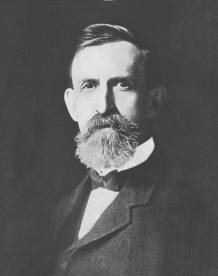|
|
|

|
| |
   |
|
| |
 |
|
|
| |
|
|
|
|
|
|
|
|

|
|
|
|
Born: December 20, 1849
|
|
Died: August 17, 1917
|
|
|
|
|
|
Complete HarpWeek Biography:
John Kern was the unsuccessful Democratic vice-presidential nominee in 1908 and a United States senator from Indiana (1911-1917). He was born on December 20, 1849, in Alto, Indiana, the son of Dr. Jacob Harrison Kern and Nancy Ligget Kern. The family moved to Warren County, Iowa, in 1854, and then returned to Indiana in 1863, following the death of his mother. John Kern was educated in the common schools in Iowa and Indiana. After graduating at the age of 15 from a teachers’ college in Kokomo, Indiana, he taught school until entering the University of Michigan Law School in 1867. Two years later, he graduated, passed the bar, and then established a law practice in Kokomo. In 1870, he married Anna Hazzard, who died in 1884. He then married Araminta Cooper.
Shortly after beginning his legal career, Kern became active in the Democratic Party. In 1870, he failed in a bid to win a seat in the Indiana House of Representatives, but the next year was elected the city attorney of Kokomo. He served in that position until 1884, when he was elected reporter of the Indiana Supreme Court. When the term ended (1885-1889), he practiced law in Indianapolis. In 1892, he was elected to a seat in the Indiana Senate (1893-1897), where he became a leading member, particularly known for his efforts on behalf of organized labor. Despite his opposition to free silver, he supported Democratic nominee William Jennings Bryan in 1896. Kern was the unsuccessful gubernatorial nominee of Indiana Democrats in both 1900 and 1904. In 1908, he was nominated as Bryan’s vice-presidential running mate. Although both men campaigned energetically, they were soundly defeated by the Republican national ticket of William Howard Taft and James Sherman, 321-162 in the Electoral College and 52%-43.5% in the popular vote.
The Democratic Party in Indiana fared better than the national ticket in 1908 by winning control of the state legislature, but Kern was disappointed when the new majority failed to elect him to the U.S. senate. However, when Democrats retained control of the legislature two years later, they chose Kern to replace the incumbent Republican senator, Albert Beveridge. (The direct popular election of U.S. senators was not mandated until the 17th Amendment in 1913.) After Democrats won control of the U.S. Senate in 1912, Kern was elected, despite his short tenure of service, as the party’s floor leader. He promoted restrictions on child labor and other progressive reforms, initiated an investigation of labor conditions in West Virginia, and cooperated with the agenda of Democratic President Woodrow Wilson. Narrowly defeated for reelection in 1916, he served out his term until March 1917, and died of tuberculosis only five months later, on August 17.
Sources consulted: Dictionary of American Biography and Biographical Directory of the United States Congress (online). |
| |
|
|
|
|
|
|
|
|
|
|
|
|
|
|
|


